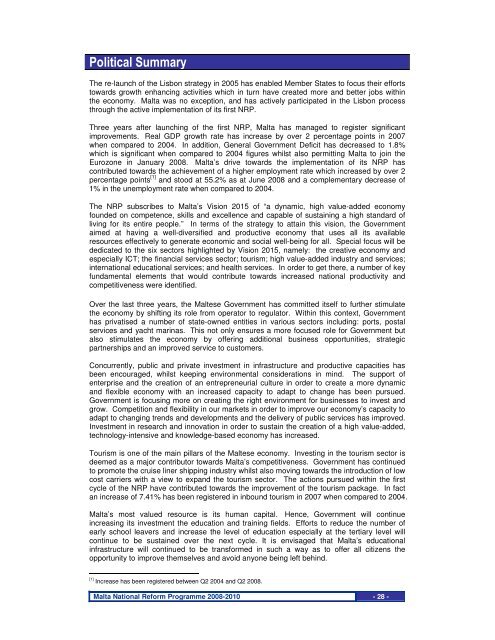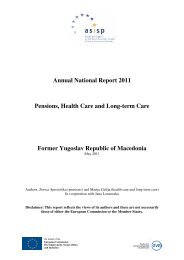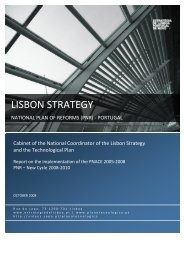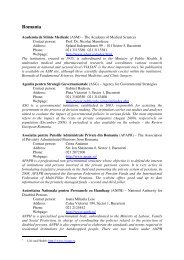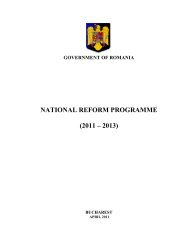National reform programme 2008-2010 Malta - European Commission
National reform programme 2008-2010 Malta - European Commission
National reform programme 2008-2010 Malta - European Commission
You also want an ePaper? Increase the reach of your titles
YUMPU automatically turns print PDFs into web optimized ePapers that Google loves.
Political Summary<br />
The re-launch of the Lisbon strategy in 2005 has enabled Member States to focus their efforts<br />
towards growth enhancing activities which in turn have created more and better jobs within<br />
the economy. <strong>Malta</strong> was no exception, and has actively participated in the Lisbon process<br />
through the active implementation of its first NRP.<br />
Three years after launching of the first NRP, <strong>Malta</strong> has managed to register significant<br />
improvements. Real GDP growth rate has increase by over 2 percentage points in 2007<br />
when compared to 2004. In addition, General Government Deficit has decreased to 1.8%<br />
which is significant when compared to 2004 figures whilst also permitting <strong>Malta</strong> to join the<br />
Eurozone in January <strong>2008</strong>. <strong>Malta</strong>’s drive towards the implementation of its NRP has<br />
contributed towards the achievement of a higher employment rate which increased by over 2<br />
percentage points [1] and stood at 55.2% as at June <strong>2008</strong> and a complementary decrease of<br />
1% in the unemployment rate when compared to 2004.<br />
The NRP subscribes to <strong>Malta</strong>’s Vision 2015 of “a dynamic, high value-added economy<br />
founded on competence, skills and excellence and capable of sustaining a high standard of<br />
living for its entire people.” In terms of the strategy to attain this vision, the Government<br />
aimed at having a well-diversified and productive economy that uses all its available<br />
resources effectively to generate economic and social well-being for all. Special focus will be<br />
dedicated to the six sectors highlighted by Vision 2015, namely: the creative economy and<br />
especially ICT; the financial services sector; tourism; high value-added industry and services;<br />
international educational services; and health services. In order to get there, a number of key<br />
fundamental elements that would contribute towards increased national productivity and<br />
competitiveness were identified.<br />
Over the last three years, the Maltese Government has committed itself to further stimulate<br />
the economy by shifting its role from operator to regulator. Within this context, Government<br />
has privatised a number of state-owned entities in various sectors including: ports, postal<br />
services and yacht marinas. This not only ensures a more focused role for Government but<br />
also stimulates the economy by offering additional business opportunities, strategic<br />
partnerships and an improved service to customers.<br />
Concurrently, public and private investment in infrastructure and productive capacities has<br />
been encouraged, whilst keeping environmental considerations in mind. The support of<br />
enterprise and the creation of an entrepreneurial culture in order to create a more dynamic<br />
and flexible economy with an increased capacity to adapt to change has been pursued.<br />
Government is focusing more on creating the right environment for businesses to invest and<br />
grow. Competition and flexibility in our markets in order to improve our economy’s capacity to<br />
adapt to changing trends and developments and the delivery of public services has improved.<br />
Investment in research and innovation in order to sustain the creation of a high value-added,<br />
technology-intensive and knowledge-based economy has increased.<br />
Tourism is one of the main pillars of the Maltese economy. Investing in the tourism sector is<br />
deemed as a major contributor towards <strong>Malta</strong>’s competitiveness. Government has continued<br />
to promote the cruise liner shipping industry whilst also moving towards the introduction of low<br />
cost carriers with a view to expand the tourism sector. The actions pursued within the first<br />
cycle of the NRP have contributed towards the improvement of the tourism package. In fact<br />
an increase of 7.41% has been registered in inbound tourism in 2007 when compared to 2004.<br />
<strong>Malta</strong>’s most valued resource is its human capital. Hence, Government will continue<br />
increasing its investment the education and training fields. Efforts to reduce the number of<br />
early school leavers and increase the level of education especially at the tertiary level will<br />
continue to be sustained over the next cycle. It is envisaged that <strong>Malta</strong>’s educational<br />
infrastructure will continued to be transformed in such a way as to offer all citizens the<br />
opportunity to improve themselves and avoid anyone being left behind.<br />
[1] Increase has been registered between Q2 2004 and Q2 <strong>2008</strong>.<br />
<strong>Malta</strong> <strong>National</strong> Reform Programme <strong>2008</strong>-<strong>2010</strong> - 28 -


